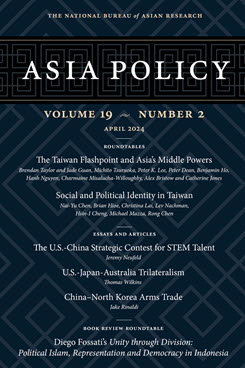Asia Policy 19.2
April 2024
This issue of Asia Policy features two roundtables on cross–Taiwan strait complexities: one on strategies Asia’s middle powers may adopt in response to growing tensions across the strait, and one on the drivers of Taiwan’s own shifting political and social identities. The issue contains a special essay on the role that immigration plays in providing the United States a unique STEM talent advantage in tech competition with China. It includes articles on security cooperation between the United States, Japan, and Australia through the Trilateral Strategic Dialogue and on the evolving dynamics of China–North Korea bilateral arms trade. The issue concludes with a roundtable on Diego Fossati’s book Unity through Division: Political Islam, Representation and Democracy in Indonesia that discusses the reasons behind Indonesians’ increased satisfaction with their political system despite democratic backsliding.
Roundtable
The Taiwan Flashpoint and Asia’s Middle Powers
Roundtable
Social and Political Identity in Taiwan: Implications for Taiwan’s Security
Special Essay
The Immigration Advantage in the U.S.-China Strategic Contest for STEM Talent
Article
U.S.-Japan-Australia Trilateralism: The Inner Core of Regional Order Building and Deterrence in the Indo-Pacific
Article
China–North Korea Arms Trade from the Perspective of Chinese Scholars
Book Review Roundtable
Diego Fossati’s Unity through Division: Political Islam, Representation and Democracy in Indonesia
About Asia Policy
Asia Policy is a peer-reviewed scholarly journal presenting policy-relevant academic research on the Asia-Pacific that draws clear and concise conclusions useful to today’s policymakers. Asia Policy is published quarterly in January, April, July, and October and accepts submissions on a rolling basis. Learn more


